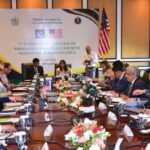Experts highlight the urgency to regulate TFAs during the launch of the TRANSFORM Pakistan campaign
Islamabad, August 22, 2023: The detrimental impact of trans-fatty acids (TFAs) on human health has gained significant attention in recent years, and the urgency to regulate their presence in all foods must become a top public health priority for Pakistan, said Mr. Munawar Hussain, Country Coordinator of Global Health Advocacy Incubator (GHAI) at the launch of the TRANSFORM Pakistan campaign here in Islamabad.
Trans fatty acids or TFAs are unsaturated fatty acids predominantly formed during the hydrogenation process that converts liquid oils into solid fats. These compounds have been proven to elevate levels of LDL cholesterol, commonly known as “bad cholesterol,” while reducing HDL cholesterol, the “good cholesterol,” leading to an elevated risk of heart disease and stroke. Additionally, TFAs have also been associated with a spectrum of other ailments.
“The TRANSFORM Pakistan campaign is an endeavour by GHAI and its partners, Pakistan Youth Change Advocates (PYCA) and Center for Peace and Development Initiatives (CPDI) to curtail the ill effects of TFAs on Pakistan’s public health indicators by achieving a mandatory national limit of 2 grams of industrially produced TFA per 100 grams of total fat in all foods,” shared Areebah Shahid, the Executive Director of PYCA.
Ranking second in the WHO-EMRO region for TFA consumption, Pakistan faces a pressing need to address this issue. The country struggles in introducing effective TFA regulations resultantly it had contributed significantly to the burden of non-communicable diseases (NCDs). Heart diseases and stroke is among the top killers of Pakistanis. In 2021 alone, approximately $2640 million was spent on diabetes, with projections indicating that 62 million Pakistanis could be living with diabetes by 2045. The economic cost of obesity was estimated at PKR 428 billion in 2015.
Dr. Khawaja Masuood Ahmed, National Health Coordinator Nutrition and National Fortification Alliance at the Ministry of National Health Services Regulations and Coordination (NHSR&C) while speaking on the occasion shared that achieving best policy practices is our ultimate priority to eliminating TFAs from the food supply. Though some significant progress has been made recently in setting TFA limits by Pakistan Standards and Quality Control Authority but there are several dozens of products like salty snacks, deserts, street foods, chocolates and confectionaries which are potentially high sources of iTFAs but still not covered in the standards.
“Pakistan’s government is exploring all avenues to pave the way for a healthier and thriving nation. Among others, these include setting mandatory TFA limits as per WHO guidelines, implementing compulsory front of pack labeling on all ultra-processed foods, promoting healthier alternatives, and fostering widespread awareness.” Senator Fawzia Arshad also pledged complete legislative support for the regulation and eventual elimination of trans-fats from dietary sources in Pakistan. “As your senator, rest assured, I will support the best policy practice to ensure that all foods across our country are free of trans-fats.”
A wealth of scientific evidence underscores the need to address this issue promptly. This was further reiterated by Dr. Anjum Jalal, Executive Director Rawalpindi Institute of Cardiology while presenting his keynote address at the event. “TFAs have been linked to serious health concerns including heart disease, stroke, diabetes, obesity, Alzheimer’s disease and both male and female infertility.”
Summing up the discussion, Mr. Mukhtar Ahmed, Executive Director CPDI said, “The government, legislature and the country’s civil society must come on the same page to overcome the lag we’ve experienced both in terms of policy reforms and creating sufficient demand to regulate trans-fatty acids in all dietary sources across the country for improving public health outcomes and combatting the rising tide of non-communicable diseases.”










